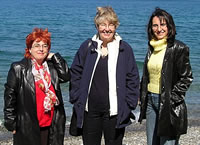MirandaNet presence in the UK and throughout the World
International | Africa | Bangladesh | Chile | China | CzechMiranda | Japan | Macedonia | Mexico | MiraNet | MirandaNorth | Poland | Regional | Romania | Star | Taiwan | Thailand | UK-Japan Science | UK-China Links | USA
Visit to Skopje and Bitola, Macedonia April 2006
MirandaNet Report by Susan Williams, MA, Dip Ed.
Background | In Skopje | In Bitola | Conclusion | Gallery
Background
The invitation to work in Macedonia followed the visit to the United Kingdom of a number of educators from the pedagogical faculties of Skopje and Bitola Universities, where primary school teachers are trained. In November 2005, MirandaNet Fellow, Lawrence Williams, had presented his London school’s use of ICT tools for cross-curricular education, and this work generated much interest. Accordingly, a series of emails was sent to London, inviting the further sharing of ideas for using ICT across the school curriculum. These invitations were warmly accepted by Lawrence and me.
In Skopje
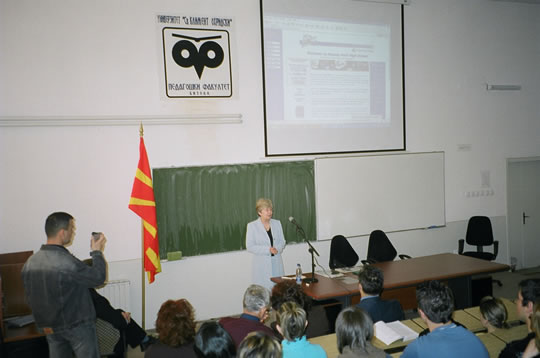 Lawrence
and I had accepted the invitation of Lence Miloseva to visit the pedagogical
faculty of St. Kliment Ohridski, a teacher training faculty in the Macedonian
capital, Skopje. This faculty specialises in kindergarten and primary education,
over a four year course. Anita and Yuri were very generous with their time,
and set out to give us a true feel of their work. The Dean, Dr Murat Murati,
a specialist in Macedonian botany, graciously welcomed us with strong Macedonian
coffee, and expressed the hope that links with MirandaNet, and participation
in the STAR project, could be established. Lawrence explained that Francis
Howlett was already working on a web presence for Macedonian teachers on the
London server, and that they would be very welcome to become a new Chapter
in the global MirandaNet community.
Lawrence
and I had accepted the invitation of Lence Miloseva to visit the pedagogical
faculty of St. Kliment Ohridski, a teacher training faculty in the Macedonian
capital, Skopje. This faculty specialises in kindergarten and primary education,
over a four year course. Anita and Yuri were very generous with their time,
and set out to give us a true feel of their work. The Dean, Dr Murat Murati,
a specialist in Macedonian botany, graciously welcomed us with strong Macedonian
coffee, and expressed the hope that links with MirandaNet, and participation
in the STAR project, could be established. Lawrence explained that Francis
Howlett was already working on a web presence for Macedonian teachers on the
London server, and that they would be very welcome to become a new Chapter
in the global MirandaNet community.
It was reminiscent of our experience of MirandaNet’s work, in South Africa, that teaching at the faculty was undertaken in several different languages. Professors chose to concentrate on Macedonian, Albanian or Turkish, as these languages are all variously spoken by teachers and students. Graduate students would spend their working lives in schools using one or more of these languages. They claimed that 90% of kindergarten and primary student teachers were trained at St. Kliment Ohridski.
A new subject-specific ICT room was under construction and, with the guidance of Anita and Yuri, all the screens faced the same way so that lecturer could easily see every screen.
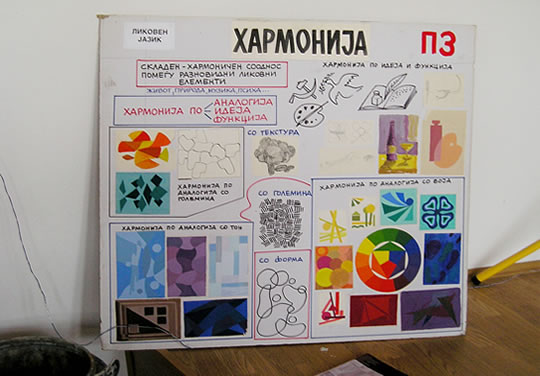 Lawrence
and I also visited other departments. In the Art Department, where the emphasis
was on giving students the language of art, the Head of Department, Mr. Rashat
Ahmenti explained that his students used ICT for their Dissertations, and
Lawrence recommended “PhotoShop” as a useful program in developing
aspects of creative art work, as he would be showing in his lecture, later
in the week. In perfect English, Mr. Ahmenti explained his belief that Art
shared a common cultural heritage. He explained that Nature moves in circles,
but only a trained mind would be able to draw straight lines, and right-angles.
In an unwitting foretaste of the STAR presentation, and obviously in tune
with its purpose, he explained that this is why NASA scientists looked for
straight lines and right-angles on Mars, as one clear indication of intelligent
life. It was also interesting to see the students’ completed work in
mask and puppet making. Puppetry is an important element in Macedonian early
education, enabling children to develop language skills, and to strengthen
ethical concepts.
Lawrence
and I also visited other departments. In the Art Department, where the emphasis
was on giving students the language of art, the Head of Department, Mr. Rashat
Ahmenti explained that his students used ICT for their Dissertations, and
Lawrence recommended “PhotoShop” as a useful program in developing
aspects of creative art work, as he would be showing in his lecture, later
in the week. In perfect English, Mr. Ahmenti explained his belief that Art
shared a common cultural heritage. He explained that Nature moves in circles,
but only a trained mind would be able to draw straight lines, and right-angles.
In an unwitting foretaste of the STAR presentation, and obviously in tune
with its purpose, he explained that this is why NASA scientists looked for
straight lines and right-angles on Mars, as one clear indication of intelligent
life. It was also interesting to see the students’ completed work in
mask and puppet making. Puppetry is an important element in Macedonian early
education, enabling children to develop language skills, and to strengthen
ethical concepts.
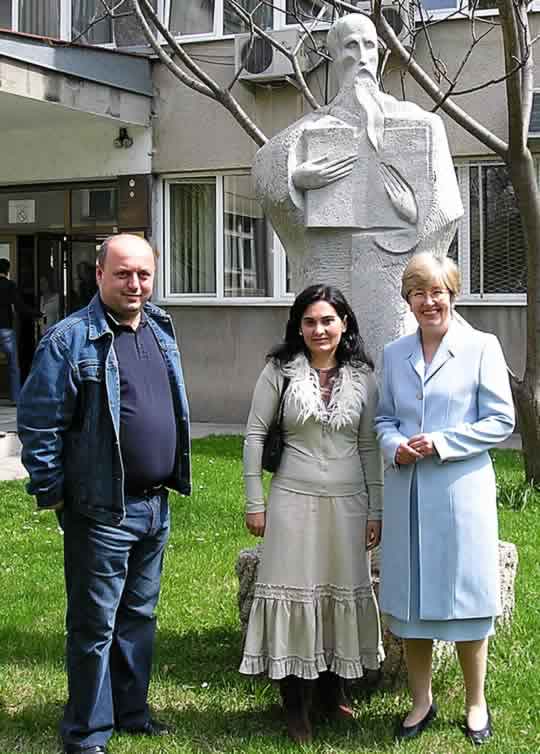 Ljupco
Sokolov, the Head of Music and an accomplished viola player, split his teaching
time between the Music Conservatoire and St. Kliment Ohridski, where he taught
keyboarding skills and essential musical notation. The electronic keyboards
were coupled up to a local area network.
Ljupco
Sokolov, the Head of Music and an accomplished viola player, split his teaching
time between the Music Conservatoire and St. Kliment Ohridski, where he taught
keyboarding skills and essential musical notation. The electronic keyboards
were coupled up to a local area network.
Anita, who kindly took time out from her teaching commitment to talk with us, is currently working on her Master’s degree, with the subject of ICT in the Primary Curriculum. She is keen to emphasise incorporating ICT into subject areas, as well as teaching it as a subject. I explained how MirandaNet Fellows have encouraged this development, and that the MirandaNet web site provided access to a range of support materials.
In Bitola
We travelled in the local coach to Bitola on a four-hour journey. I gave my first presentation on behalf of MirandaNet, while Lawrence gave two presentations and led a MirandaNet Workshop. I concentrated on my own use of ICT in the classroom, as a Business Studies, English, and Special Needs teacher. (This year I am not teaching RE!). I structured the talk starting with how I use one computer, and led up to my use of the school network. We had been told on arrival that the audience would be made up of students and practising teachers of primary education, but I was easily able to link in my images of Sake manufacturing in my PowerPoint presentation. These images came about through a visit to the Japanese Emperor’s Sake factory, in Kyoto, Japan, kindly arranged by Madoka, the wife of Japan’s MirandaNet Fellow, professor Hiro Tanaka. I suggested that similarly scanned photographs, in a picture book, could be shared with a class at “story time”. The Professor with responsibility for primary reading complimented me on my logical presentation, and I was pleased that this lecture was seen to follow the high standards of MirandaNet.
At coffee time, we welcomed the opportunity to share ideas with the lecturers of the University of Bitola, including the Vice Dean, Professor Zlatko Zoglev. We stressed that MirandaNet provided an on-line forum for solving problems, and also for sharing good practice. This information was enthusiastically received by these pioneers in Macedonian ICT teaching. We were then welcomed by the Dean, Dr Simeon Siljanovski, who graciously invited us to dine with him that night. We were also pleased to have the opportunity to meet other teachers in the faculty over more cups of bracing Macedonian coffee.
During the morning of Wednesday 12th April, Lawrence was interviewed by both the National and a local cable television station. The two channels interviewed him separately, so that two sets of viewers now know first hand about MirandaNet, and secondly about the STAR Project. While this added to an already busy day, it nonetheless served and supported the purpose of our visit.
Lawrence’s talk was on the development of cross-curricular ICT use, from the Light Project through to his current work on the STAR Project. As all the published papers referring to his projects are also documented on the MirandaNet site, he concentrated on outlining them briefly, and referred participants to MirandaNet to study them in detail. His examples of school work were limited to his Year 7 and 8 pupils (ages 11 to 13) in order to match the needs of the audience, where primary education finishes at age 14.
The Dean at Bitola University, Professor Simeon Siljanovski, had kindly arranged that Dr Tatjana Atanasoska and Assistant Professor Daniela Andonovska-Trajkovska could rearrange their teaching commitments, which start at 7.30 a.m. and continue into the small hours, with the marking of their end of semester projects. Macedonia follows Christian Orthodox religious holidays so their Easter this year was the following weekend from ours in the UK. They worked on our Good Friday. This continuity of translation, and support, their attention to detail, and unfailing kindness were much appreciated by us both.
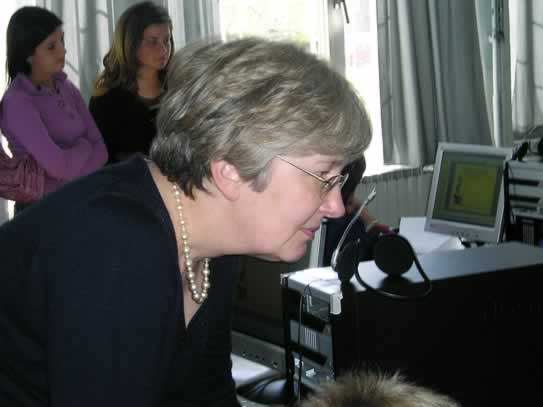 The
afternoon was spent watching Macedonian ICT in action, in Elpida Kazamandi,
a school named after a national heroine of World War II. We thought that MirandaNet
Kazamandi had a pleasant ring to it, but acknowledge that the new leaders
of the MirandaNet Chapter in the country must make their own decision about
a name. The teachers in Elpida Kazamandi are enthusiastic in their wish to
showcase their pupils’ work on MirandaNet. We were privileged to be
invited to view classes in three different subject areas, by three different
specialists. The class sizes averaged 30 using 15 new computers. These computers
and those in other Macedonian schools had been donated by the Chinese Government.
The
afternoon was spent watching Macedonian ICT in action, in Elpida Kazamandi,
a school named after a national heroine of World War II. We thought that MirandaNet
Kazamandi had a pleasant ring to it, but acknowledge that the new leaders
of the MirandaNet Chapter in the country must make their own decision about
a name. The teachers in Elpida Kazamandi are enthusiastic in their wish to
showcase their pupils’ work on MirandaNet. We were privileged to be
invited to view classes in three different subject areas, by three different
specialists. The class sizes averaged 30 using 15 new computers. These computers
and those in other Macedonian schools had been donated by the Chinese Government.
The first class linked poetry, biology and art, when nine-year-old pupils followed a presentation prepared by one of the class (and her older brother) on the characteristics of butterflies. This was followed by a poem about butterfly flight. The pupils finished the session using the “Draw” package to create their version of a butterfly. We have asked for a lesson plan by Gordana Ugrinovska of this lesson, for display on Mirandanet.
 The
Geography lesson had older pupils re-ordering a delivered text, illustrating
it with their choice of internet pictures, and completing the task with additional
information on agricultural and animal farming in Macedonia.
The
Geography lesson had older pupils re-ordering a delivered text, illustrating
it with their choice of internet pictures, and completing the task with additional
information on agricultural and animal farming in Macedonia.
The final class was learning the Macedonian language, and was a grammar lesson. The introduction saw the trainee student teacher using the main computer screen to remind pupils of parts of speech. Working in pairs, the pupils described illustrations in complex sentences. Again, Macedonian hospitality was warm, and we appreciated the opportunity to share information informally over more coffee and biscuits.
The evening meal with the Dean, and English lecturer Maja Stela, was a sampling of traditional dishes and wine, accompanied by live Macedonian folk music. The Dean is an internationally renowned artist, whose work ranges from abstract painting to icons. Much of his work has been sold to America. Maja Stela, the lecturer with responsibility for students who will be teaching English, is a published poet, and kindly gave us books of her poems. She splits her work between a school and the University, and in her spare time enjoys creating miniature sculptures, viewing them through a magnifying glass. The excellent company, attractive surroundings, and delicious food enhanced our conversation about the future for MirandaNet in Macedonia and possible student involvement in the NASA STAR project.
Lawrence’s final presentation, on Thursday morning, concentrated specifically on the STAR project, emphasising that it could be undertaken by the two schools in Macedonia which already had internet cameras. Our later Workshop in the ICT lab enabled the practising teachers to log onto MirandaNet and explore the menu and links to various sites, including STAR.
 As
a result of this Workshop, Daniela Andonovska-Trajkovska was acknowledged
as Macedonia’s MirandaNet link person, with support from Tatjana, her
Head of Department. Josef, a student, was to become the co-opted and paid
technician to establish a web site in the Macedonian language, and a governing
lead team was formed as a necessary support to Daniela. Papers written in
English would be sent by Daniela to Lawrence, who would forward them to MirandaNet
for publication on the London site.
As
a result of this Workshop, Daniela Andonovska-Trajkovska was acknowledged
as Macedonia’s MirandaNet link person, with support from Tatjana, her
Head of Department. Josef, a student, was to become the co-opted and paid
technician to establish a web site in the Macedonian language, and a governing
lead team was formed as a necessary support to Daniela. Papers written in
English would be sent by Daniela to Lawrence, who would forward them to MirandaNet
for publication on the London site.
The lunch hour gave us the chance to meet the students specialising in English, who had been timetabled in other areas and had missed our presentations. It was humbling to confront such a large group who were willing to give us their free time, and exciting to see their interest both in MirandaNet and in STAR.
The afternoon visit to St. Kliment Ohridski afforded us the opportunity to see two students from the University at different stages of their training, in an observed and graded practice lesson, showing their use of ICT in their own subject area. The school provided a translator, Nikola Avramovski, who furnished us with the information that some teachers had four probationary years before gaining a permanent contract!
The younger teaching student had prepared a video, presented on the University’s PC, and loaned for the occasion, showing the tools used for different traditional crafts. The 9 year olds were encouraged to name these tools, and later identify those needed for, say, tailoring or cobbling. The video was extremely well filmed and crafted, and would be a valuable asset to any UK Business Studies or Enterprise lesson.
The more experienced student teacher delivered a Macedonian language lesson. She had created a PowerPoint presentation with the text of the “Beauty and the Beast” story illustrated generously including stills from the Disney cartoon. This she read to the class. Her next PowerPoint presentation offered amusingly illustrated choices, and key stages, of the story. For example, What if Beauty had been ugly? Would she have consulted a plastic surgeon or a magician? Each choice was supported by an entertaining picture. The consequences of the class’s choices were shown to gales of laughter from the 7 year olds. It was an enchanting experience. It was also, of course, a brilliant practice in thinking skills, and in addition in language acquisition. We were told that the students are creating a bank of traditional folk tales so that, when they finish the course, they have a body of prepared material to share and use.
Conclusion
- a group of university lecturers ready and willing to take responsibility for creating a new MirandaNet Chapter
- an identified MirandaNet leader and supporting group
- established and creative teachers, now preparing material for consideration for them to become MirandaNet Fellows
- the expertise and wish to create a MirandaNet website, in Macedonian
- students seeing the future, and inspired to teach STAR
- Deans in two institutions highly supportive of their staff
- the Dean at Bitola wishing to have MirandaNet associated with his University
- two primary schools keen to develop further international links, and with huge expertise and creative ideas to share
- interest in MirandaNet and STAR from two television companies
This was a successful visit, from which we return with many creative ideas to use in our own teaching. We also wanted you to see that Macedonia is a beautiful country, and, to encourage you to link with Macedonia, we attach a small picture gallery to illustrate the point.
Susan Williams
April 17th 2006
[Back]

